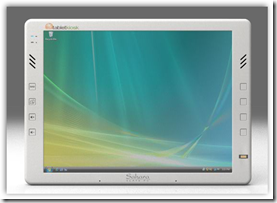The double click question and yes, I get that question quite frequently myself. I just happened to speak yesterday at a Computer Friends Users group in Newport Beach and it is always a joy to revisit the Oasis Computer Friends group. I left the selection of the topic open to the group for what area they might want to hear about, and the topic they chose and wanted more information about was "Speech Recognition". When you stop and think about it, this makes perfect sense! Why type when there are other ways to interact with a computer these days? I use it all the time, lengthy emails, etc.
Granted this is a healthcare blog, but I also like to include other relative area that involve helping people all the way around with computers. I had my Tablet PC with me, which I connected to the web and the overhead projector and went to town. I had a few curious individuals too that were in total fascination with how the Tablet PC functions, and mentioned that they could watch CSI-NY every week to see this particular unit in action from TabletKiosk. I did take a few moments out to show the blog as it contains a lot of useful information for seniors as well, with a few of my recent posts being featured in the retirement section of the Wall Street Journal, especially where to find the links for the $4.00 generic prescriptions from the retailers all in one place. 
The focus was using Microsoft Vista speech recognition. Of the group of around 40 or so at the meeting, I saw hands of around 10-12 individuals in the group that were running Vista, and perhaps this will encourage others who have not made the leap yet, to give it some thought. The best way to get Vista, especially for those who have some aging computers I suggested was to look at getting a new computer. The tablet I use from TabletKiosk has 2 dual array microphones, so in my demonstration with the room being quiet, I was able to show hands free dictation with speech recognition in a simple Word document, and the looks of surprise were amazing. I also  went over the fact that a microphone is needed with some desktops and even some notebooks.
went over the fact that a microphone is needed with some desktops and even some notebooks.
Part by accident, I touched on the "Narrator" feature in Windows. This was not on the agenda, but due to a question posed, I also demonstrated how your computer can "read" out loud as well. We had a little fun on the settings with slowing the voice down to where it sounded like the computer was intoxicated, but all in good fun and to make the experience a little more interesting. The narrator feature was something that held the interest of all, again making access easier for those who may have issue with reading everything in print.
All in all, speech recognition in Vista is fairly simple in nature to train and use, and it works well. While the Tablet was connected to the overhead projector I also demonstrated a little inking, and inking to text and pass around a smaller UMPC tablet for everyone to check out and touch. Inking was definitely a hot topic and some of the individuals who already have Vista were amazed to find out that inking is already there with Vista and we discussed briefly on how a Wacom tablet device can be connected to a desktop, great for those who write but are not speed demons at the keyboard!
On this same note with dictation I did a quick video with EMR Update earlier this year in a very noisy convention hall where the unit was being shown to healthcare individuals. Bad hair day, but the tablet looked great.
I think in time I'll will want to revisit the group and see how everyone is doing! Nice to see seniors with questions and wanting to do more with their computers and wanting to know how to get beyond the keyboard and explore other ways to interact with their computers and many thanks for allowing me to be their guest! So in addition to larger targets, these are other options that can be used as well! BD
"Using a computer mouse is fundamental to interacting with current computer interfaces", says Dr Faustina Hwang, who led the research. "The introduction of expanding targets could lead to substantial benefits because older people would feel more confident in their ability to control a mouse and cursor. A computer can be a real lifeline for an older person, particularly if they're living alone, and expanding targets could help them harness that potential."
One of Dr Hwang's PhD students is now investigating the specific difficulties older people experience when trying to double-click a computer mouse – an essential function in opening applications and other key computing functions.
Easier-to-hit 'targets' could help older people make the most of computers




0 comments :
Post a Comment